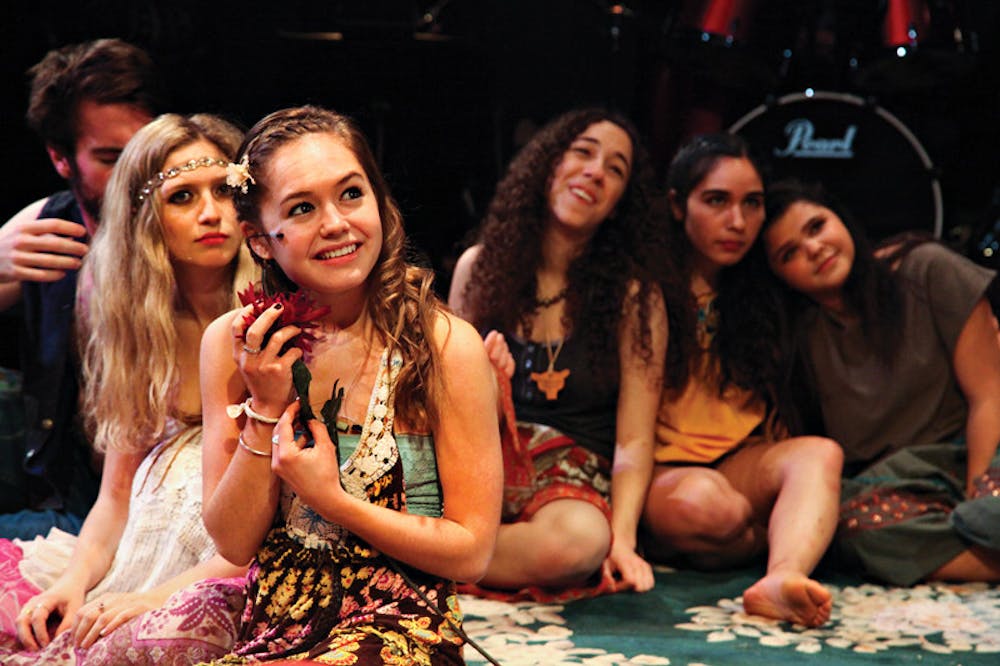Should you find yourself at Production Workshop this weekend, expect to be touched — literally.
This is not meant to alarm. The caresses are encouraging, the embraces gentle. Viewers are also likely to be hit on, laughed at, danced with and offered a joint. But don’t get your hopes up — these last gifts are only paper.
Participatory antics are part of the fun with “Hair,” Musical Forum’s latest production directed by Kate Brennan ’14 in the PW Downspace. Staged in the round, the production invites the audience to a communal experience. Actors perform in front of, behind and on top of viewers with casual fluidity. The ritualistic, celebratory atmosphere adds intimacy to the story’s chaotic orbit around community and isolation, conformity and disobedience, ecstasy and agony.
“Hair,” the American theater’s foundational rock musical, is a tragicomic romp through the cultural, political and sexual disruptions of 1960s counterculture. The story centers on a band of free-loving miscreants known as the Tribe, whose experimentations with sexual liberation, alternative living and hallucinogenic drugs are punctuated by their outrage at the violent injustices of their historical moment.
The work offers perspective on the Vietnam War, the Civil Rights Movement and the sexual revolution through the Tribe’s personal experiences with draft dodging, protesting and general acting out. It is a portrait of a youth in revolt — a generation grappling with their place in a morally-suspect establishment. Brennan’s decision to stage the show in the round makes for an immersive, visceral work of theater. The audience is not only invited to the party but also complicit in the violence, implicated in the injustice.
Her efforts are aided by Skylar Fox’s ’15 exquisite set design. The drama unfolds in a bohemian den atop a rug-adorned platform and textile-draped scaffolding, surrounded by a portion of the audience sitting on blankets and pillows — it is as if Spectrum India exploded in the Downspace. Lighting design by Jared Rosa ’14 — particularly the makeshift chandelier at center stage — lends the proceedings warmth and intimacy. Flashing color bulbs intensify a communal hallucination.
The cohesive ensemble’s irresistible tribal verve is the production’s great achievement. Actors are clearly enjoying themselves, and the audience will feel privileged to take part in their raucous powwow. Movement director Jacqueline Braslow ’14 deserves a firm handshake. In repose or high on assorted hallucinogenic drugs, the actors maintain a cohesive gestural vocabulary of flailing limbs. With eclectic costuming by Sofia Kadieva ’16, Sophia Washburn ’16 and Alex Lee ’14, they look the part — and naturally, there are some great wigs.
Vocally speaking, music director Simon Goldring ’15 runs a tight ship. There is a long score of music to get through, and Goldring thankfully maintains a brisk pace. Though harmonies are consistently precise and energetic even through tricky passages of music, one is nevertheless left with a general lack of tenor.
Indeed, the men are outshined in this production. Jesse Weil ’16 interprets the pivotal role of Claude sensitively, and Brian Semel ’16 is consistently hilarious in a number of gags, but most of the rest seem somewhat interchangeable. Peter Bowden ’16 is a tad overzealous as cult leader Berger — one can only take so much gyrating — but he charges the cast with so much energy that some of his more overwrought flailing is forgivable.
The women of “Hair” are the show’s vocal and emotional nexus. From the moment she intones the show opener “Aquarius,” Emma Chasen ’14 is the Tribe’s indisputable mother goddess — keep your eyes peeled for the girl with the green hair in the purple romper. Katherine Doherty ’16 delivers the vocal highlight as Crissy in the ballad “Frank Mills,” and high-wire soprano yips from Hannah Margolin ’16 add a delightful texture to group numbers. Emily Kassie ’14 exudes a pregnant glow as expectant mother Jeanie, and resident belter Elise Harmon ’17 lends an especially full-throated rendition of “Let the Sun Shine In.”
“Hair” is a hefty two-act endeavor, and the show loses some of its momentum in the second act. Despite creative staging efforts, the cast gets lost in the labyrinth of Claude’s bad trip. Luckily, the moments of genuine revelation, joy, desperation and pain do not suffer for it. The finale is sheer spine-tingling goodness.
First performed in 1967, “Hair” is a distinct product of its cultural moment. But take one look at last week’s controversy over New York City Police Commissioner Ray Kelly, and it is obvious that the conversations the work provokes about race, civil disobedience and institutional violence are hardly over. The chief virtue of Brennan’s production is that it acquaints audience members intimately with young people who are just as outraged, ecstatic, vulnerable and confused.

ADVERTISEMENT




